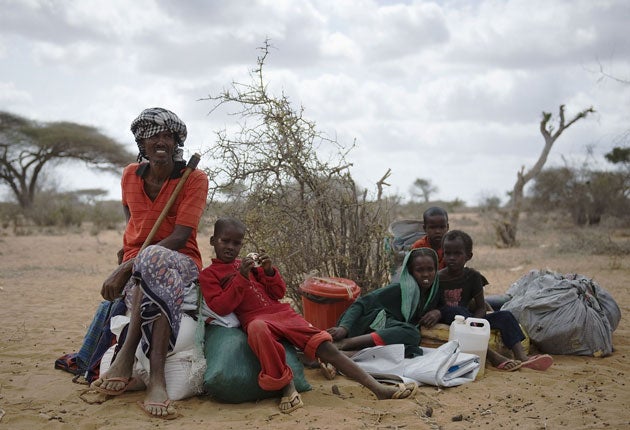African summit raises fraction of $1.4bn famine fund
Oil-rich Nigeria and powerhouse South Africa pledge pittance compared with smaller neighbours

African leaders have come under fierce criticism after a much-delayed African Union summit to tackle the food crisis in the Horn of Africa raised less than 4 per cent of the shortfall needed. Only four heads of state – from Ethiopia, Somalia, Djibouti and Equatorial Guinea – attended the meeting, designed to gather urgently needed funds to help save the nearly 13 million people now at risk of starvation on the continent.
Only 21 out of the 54 countries in the AU made pledges, with $20m of the $46m promised coming from three states – Algeria, Angola and Egypt. Aid groups say they need $1.4bn to meet the shortfall in tackling the emergency. Jean Ping, chairman of the AU commission, announced the summit had raised more than $350m, but the bulk of the sum was in fact a $300m loan from the African development bank and not a grant at all.
Small countries such as Gabon and the Gambia pledged sums way above what was expected from the size of their economies, but several bigger nations donated paltry sums. Aid experts are particularly disappointed with the amounts pledged from oil-rich countries such as Nigeria, which promised $2m, and from South Africa, supposedly the continent's economic powerhouse, which offered $1.3m.
Irungu Houghton, Oxfam's pan-Africa director, said: "It's not a contribution that's befitting of a country that size. In 2009, the amount spent refurbishing cabinet ministers' homes in South Africa was $25m, but the lives of 12 million people in the Horn of Africa get less than $2m. Once you take away citizen donations, South Africa's contribution was $1.3m; that's just $300,000 short of the amount that South Sudan contributed."
Richard Miller, chief executive of ActionAid, said many charities were turning to cash as a solution to the food crisis. "People may end up selling some of their food aid to get other goods. With cash people can buy exactly what they want. It's a form of social security payment." The World Food Programme has begun pilot projects in Kenya where funds are transferred to those going hungry. About $35 in cash is sent every month to the bank account of a nominated head of household who spends the money on getting food for the family.
Cash is not a catch-all solution, however. For children suffering from severe malnutrition, food aid is still the only option.
Give a day's pay for Africa
You've already raised an amazing £126,000:
Nearly 13 million people are at risk of dying from hunger in the Horn of Africa as a result of the worst drought in 60 years. Two million children under the age of five are malnourished and 500,000 are severely malnourished. The Independent on Sunday is asking readers, their friends and families to join its senior staff and each pledge one day's pay to the Disasters Emergency Committee appeal. High-profile figures from the worlds of politics, sport and the arts are backing us. Together, The Independent on Sunday and its sister title, The Independent, have so far raised more than £126,000. Thank you!
Join up – and help the starving
To join our 'Give a day's pay for Africa' campaign, go to independent.co.uk/giveadayspay. All donations are welcome – to give £5, enough to buy high-energy food supplements to save five children a day, text INDY to 70000. And spread the word on Twitter using the hashtag #Giveadayspay
Join our commenting forum
Join thought-provoking conversations, follow other Independent readers and see their replies
Comments
Bookmark popover
Removed from bookmarks